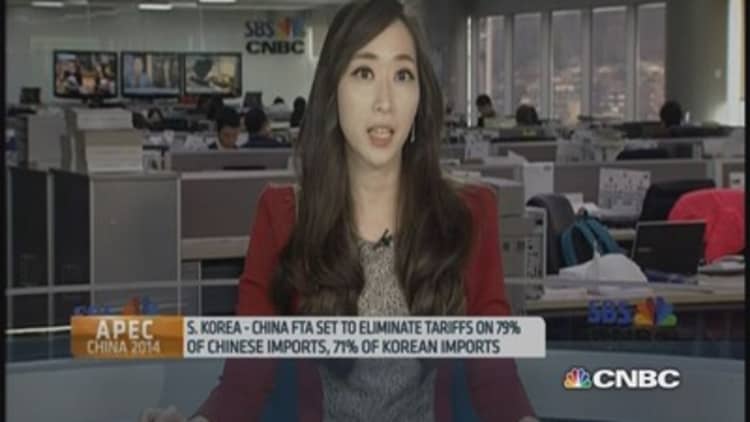
China and South Korea are set to sign a bilateral free trade agreement and analysts tell CNBC the new deal will benefit both countries differently.
After more than two years of negotiations, the countries reached an agreement on Monday following a meeting between South Korean President Park Geun-hye and her Chinese counterpart, President Xi Jinping, on the sidelines of the Asia-Pacific Economic Cooperation (APEC) summit in Beijing.
The trade pact aims to eliminate 90 percent of import tariffs across 17 areas over the next two decades, according to the mainland's state media Xinhua. Analysts expect the FTA to take effect as early as mid-2015.
Economic gains
Economically, South Korea stands to benefit the most, economists told CNBC.
The deal matters more for South Korea because exports to China account for more than 24 percent of its total exports." Jae-hwan Huh, senior economist at Daewoo Securities, wrote in an email to CNBC. China is South Korea's largest trading partner; bilateral trade between the countries totaled $230 billion last year.
Read MoreWeak Korea exports?Don't blame the yen
The deal is crucial as recent weakness in the yen makes Japanese exports increasingly competitive, while slowing economic growth in China presents another headwind, Huh said. "If tariffs are reduced, South Korean exports will be in a better position compared to other exporting countries."
"Upon implementation, China will immediately remove tariffs worth 6 percent of its annual imports," said Ronald Man, Asia-Pacific economist at HSBC. "The FTA is estimated to boost Korea's gross domestic product (GDP) by as much as 3.3 percent over time."

Politics at play?
For China, the FTA represents a "political success" as it becomes more assertive about territorial rights and seeks to balance U.S. influence in Asia.
"China has scored a political success against Japan by concluding an FTA that freezes out Japan from trade liberalization in Northeast Asia," said Rajiv Biswas, Asia-Pacific chief economist at IHS.
"Particularly, since plans for a trilateral FTA between China, South Korea and Japan have been stalled since 2012. The impasse over the planned trilateral FTA reflects the escalation in bilateral political tensions between China and Japan since 2012 over disputed territorial claims," he added.
Apart from rival claims in the East China Sea with long-time rival Japan, China China is also engaged in a territorial dispute in the South China Sea with Vietnam, the Philippines, Taiwan, Malaysia and Brunei.
South Korea is the only country in the region with which China doesn't have a maritime dispute. Both countries have seen warmer ties as of late, with China's Xi visiting Seoul in July.
Read MoreCourt jails captainof doomed Korea ferry
"I think China chose to build a long-term relationship with South Korea by penetrating economic issue first. Korea and the U.S. have been strengthening security-ties these days but at the same time, Korea leans toward China economically," said Yooil Bae, assistant professor of Political Science, School of Social Sciences, Singapore Management University.
As Washington considers installing an advanced missile defense system in South Korea, the FTA will strengthen China's voice on that issue, Bae said. "It will make competition between the two super powers more complicated."

